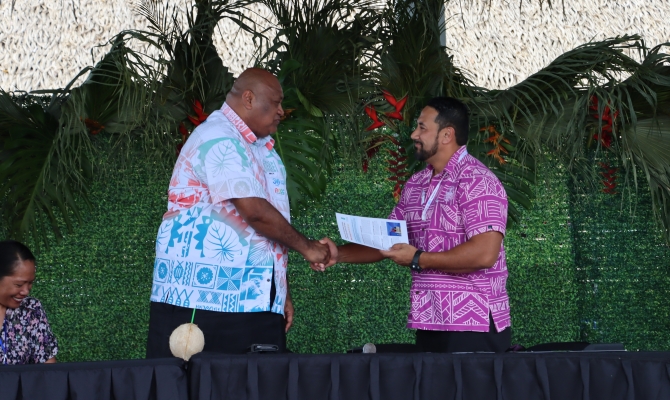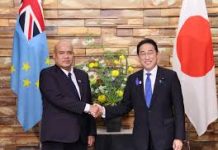A factsheets kit to assist the Pacific media report on the ongoing UN Framework Convention on Climate Change (UNFCCC) Conference of the Parties (COP) process has been launched by the Secretariat of the Pacific Regional Environment Programme (SPREP).
The launch of the Media Mana Factsheets Kit for Pacific Media took place at the Pacific Partnerships for Prosperity (PPfP) Pavilion at the Punanga Nui Market in Rarotonga, on the margins of the 52nd Pacific Islands Leaders Forum Meeting.
SPREP’s Director General, Sefanaia Nawadra, launched the first five factsheets of a series of factsheets SPREP will continue to grow. Funded by the IntraACP GCCA+ Pacific Adaptation to Climate Change and Resilience Building (PACRES) project, the factsheets cover a range of topics from What is Climate Change, Adaptation, Loss and Damage, Climate Finance to Mitigation and National Determined Contributions (NDCs).
The kit also helps to prepare journalists for travel to COP, what they can expect to find at the venue, where they can best get the assistance develop their climate change related story concepts, and how they can follow and provide coverage even when they are not present at the COP venue.
SPREP’s Communications and Outreach Adviser, Nanette Woonton, said the Media Kit builds on the foundation SPREP and its partners laid through the Pacific Media and Climate Change Toolkit launched in 2014, which provided a one-stop-shop of information on climate change and how the Pacific media could unpack and report on the UNFCCC processes.
“At SPREP, we believe the media is a critical partner in our work to build a resilient Pacific environment. The media plays an important function to inform, educate and empower communities with relevant knowledge to influence public action and policy towards our collective response to climate change,” said Woonton.
“Our Pacific countries are at the forefront of the impacts of the climate crisis. Radio, television, newspapers and the internet provide the fastest channels to communicate knowledge and information across wide areas, in an effort to reach, influence and engage a large number of people.”
The Media Kit takes into consideration a typical day in the life of a Pacific journalist. Unlike some of the bigger countries who have specialised environment and climate change reporters in their newsrooms, many Pacific countries don’t have that luxury. PACRES Manager, Semi Qamese, said these challenges provide an opportunity for SPREP to assist.
“Taking into account the challenges faced by the media houses and journalists in the region, as well as problems COVID-19 posed, this kit hopes to help journalists and media workers report on stories from the UNFCCC at the COP Venue, as well as when they cannot attend in person, or virtually,” he said.
“Our goal is to provide the media with as much support as we can through this toolkit for your use at your discretion. The PACRES project is pleased to be able to assist.”
The launch comes as the world eyes COP28, scheduled to take place from 30 November to 12 December 2023 in Dubai, UAE.
Prior to the launch of the factsheets, the PACRES project provided support for SPREP to empower the Pacific Media with a session on COP28 at the Pacific Editors Dialogue – Reporting Regionalism 2023 workshop.
To obtain a copy of the factsheets, email: sosikenil@sprep.org
SOURCE: SPREP/PACNEWS


















